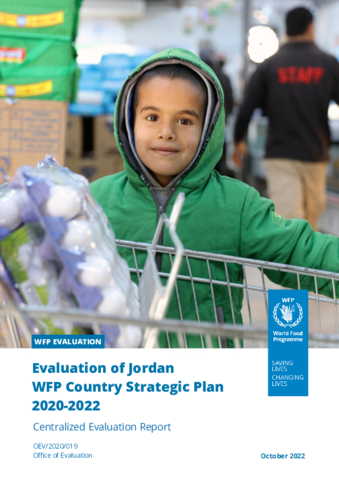
The evaluation was commissioned by the independent Office of Evaluation to provide evaluative evidence for accountability and learning to inform the design of the next WFP country strategic plan (CSP) in Jordan. It covers WFP activities implemented under the transitional interim CSP (2018–2019) and the CSP between 2020 and mid-2021.
The evaluation was conducted between May 2021 and March 2022 and assessed WFP’s strategic positioning and role and the extent to which WFP has made the strategic shift expected by the CSP; WFP’s contributions to strategic outcomes; efficiency and factors that explain WFP performance.
It concluded that:
- Overall, the CSP is aligned with the direction of the government and has remained a relevant approach to supporting the government to meet food and nutrition needs of refugees and vulnerable Jordanians. During the COVID-19 pandemic, WFP adapted its delivery processes to ensure the continuation of assistance despite reduced direct contact with beneficiaries.
- WFP maintained an essential humanitarian response during the protracted Syrian refugee crisis as the vulnerabilities of Syrian refugees and Jordanians deepened. However, there were shortcomings in communicating the targeting methodology among beneficiaries.
- To bridge the humanitarian–development divide, WFP provided capacity strengthening for national institutions and worked to harmonize its approach with national systems.
- WFP evolved further in the transition from the use of unconditional cash assistance to resilience and self-reliance activities and the development of more predictable social safety nets in partnership with the Government and other actors.
- WFP took steps to increase the efficiency, effectiveness, and sustainability of its operations, but monitoring and learning were not carried out systematically during CSP implementation.
